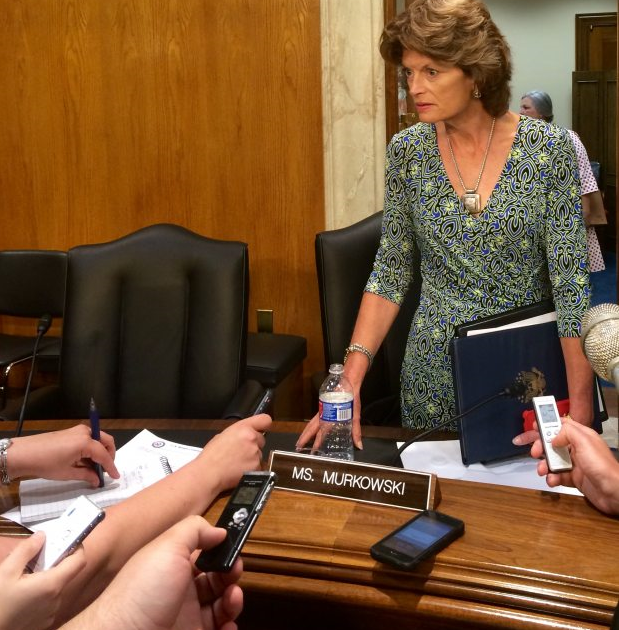Alaska senator unveils bill for Native services, firefighting

WASHINGTON — U.S. Sen. Lisa Murkowski unveiled an appropriations bill Tuesday that would ensure dedicated funding for emergency firefighting but also cut billions of dollars from federal lands and environment funding.
Murkowski chairs the subcommittee of the Senate Appropriations Committee responsible for funding the Department of Interior, the Environmental Protection Agency and related federal agencies.
The markup is the first time a regular budget bill has moved through the Appropriations Committee or the subcommittee in six years, though it is unclear whether Congress will manage to pass a regular budget before the September deadline.
Health, parks, forests among areas covered
Faced with tight spending caps, the appropriations total $31 billion, including $1.1 billion in 10-year emergency firefighting funding.
The allocations are “not the level that I think we would hope to see, but I looked at my responsibility as the chairman of this (subcommittee) … very, very carefully,” Murkowski said later at a meeting with Native Americans in the Capitol. The budget covers Indian Health Services, the Bureau of Indian Affairs, the National Park Service, the Forest Service, Fish and Wildlife, and the EPA, among others, she noted. “So it’s a whole mix, if you will, of different responsibilities.”
The bill includes a timely funding boost for activities to prevent forest fires by providing pruning and forest breaks to reduce the risk of fires spreading quickly.
Increasing emergency firefighting funds at a time of federal spending cuts has been an ongoing issue for appropriators who must include 10-year costs in the annual spending bill. Murkowski proposed a new budget mechanism aimed at stopping agencies from having to borrow across programs for unexpected — and unfunded — emergency firefighting.
Murkowski echoed that principle with provisions for funding contract support costs for Native groups, including provisions to keep the Bureau of Indian Affairs and the Indian Health Service from cutting funding from other areas to fund costs of administering transferred programs. There is “no longer going to be arm wrestling” about where the funding comes from.
“It’s going to happen and there’s just no more discussion about it,” Murkowski said to applause from the gathering of the National Center for American Indian Enterprise Development at the Capitol.
Funding for courts and social programs
The bill also includes small amounts of funding for tribal courts and programs to combat domestic violence and child sexual assault on Native lands.
Generally, committee members were unable to meet the budget requests made by President Barack Obama, even where they wanted to. The administration requested $325 million to fund the 100-year anniversary of the National Park Service in 2016, but the bill only includes about $100 million. A proposed $500 million increase for the Indian Health Service didn’t make the cut. And the EPA’s revolving loan funds for drinking water and wastewater infrastructure took a big cut from the administration’s requested funding levels.
The subcommittee quickly passed Murkowski’s bill, but Democrats are ready to go to battle over a bevy of amendments attached to the bill, including several that aim to reduce Environmental Protection Agency regulations. Traditionally, the Appropriations Committee only debates amendments before the full committee.
One of Murkowski’s top priorities will be central to that fight in the committee hearing Thursday: a road through the Izembek National Wildlife Refuge, connecting King Cove and Cold Bay, 600 miles southwest of Anchorage. Interior Secretary Sally Jewell rejected the request in 2013, but Murkowski has continued to push for a legislative response, saying the road is needed to allow life-saving transport in emergency and severe-weather conditions.
The policy rider would require the Interior secretary to approve a land exchange between the department and the state of Alaska if the state wants. The exchange would provide 206 acres in the refuge to build the one-lane road.
Controversial amendments
Other amendments that will garner controversy would allow states to bypass the EPA’s proposed greenhouse gas rule for power plants, put a hold on the EPA’s proposed ozone air quality regulation and block the agency from spending any funds implementing its “Waters of the U.S.” rule that defines what water bodies are subject to permitting requirements.
Sen. Tom Udall, a Democrat from New Mexico and the ranking member on the subcommittee, called the amendments “dangerous policy riders that undermine environmental laws that have kept our air and water clean, protected imperiled species and safeguarded sensitive ecosystems for decades.”
“I want to work with Chairman Murkowski to support the good things in this bill — including emergency funds to fight wildland fires, (and) language to reform the way we budget for wildland firefighting … But we need to do it on a bipartisan basis,” Udall said.
Related stories from around the North:
Denmark: Nordics to step up security cooperation on perceived Russian threat, Yle News
Finland: Finnish politician involved in EU nuclear safety grants for Arctic Russia, blacklisted by Moscow, Barents Observer
Norway: Looking back at the 2010 Norway – Russia deal on Arctic borders, Barents Observer
Russia: Putin signs law against “undesirable” NGOs, Barents Observer
United States: Alaska senator votes ‘Nay’ on icebreaker provision in defense bill, Alaska Public Radio Network



